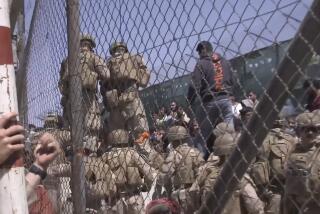As U.S. deaths in Afghanistan rise, military families grow critical
- Share via
Reporting from Queensbury, N.Y. — Bill and Beverly Osborn still can’t bring themselves to erase the phone message from their son Ben. He had called from Afghanistan in June to assure them that he was safe. Four days later, he was killed in a Taliban ambush.
The Osborns long ago accepted the risks faced by their son, an Army specialist. But what they can’t accept now are the military rules of engagement, which they contend made it possible for the Taliban to kill him.
“We let the enemy fire first, and they took my son from us,” Beverly Osborn said of the rules, which in most instances require U.S. forces to identify an enemy threat before firing, and to withhold fire if civilians are close by. The rules also place restrictions on close air support and artillery, prompting complaints from some service members that their lives are put at risk against an enemy that fights by no rules at all.
As American combat deaths have reached record levels this summer, public support is eroding for the 9-year-old conflict. Several recent opinion polls found that more than half of those surveyed oppose the war, with the high casualty rate among concerns most often cited. American combat deaths reached 60 in June, 65 in July, and 55 in August, according to icasualties.org. That is by far the highest three-month total of the war.
Criticism is mounting among military families too. An antiwar group of families of service members in Afghanistan and Iraq has called for an end to the Afghanistan war. At the same time, families like the Osborns, who describe themselves as conservative, are questioning the way the war is being waged.
After Bill Osborn publicly criticized the rules of engagement just before his son’s wake, he said, other families of service members killed or serving in Afghanistan contacted him to express similar concerns. They don’t want to end the war, Osborn said, but to change the way it’s being fought.
“Our soldiers are forced to fight with one hand tied behind their backs. They’re not allowed to take care of business — and they know it,” Bill Osborn said in his living room, where his son’s Bronze Star, Purple Heart and campaign ribbons are on display.
Debbie Morris of Arnold, Calif., who lost her son in Afghanistan on June 10, said the rules of engagement protect Afghan civilians at the expense of American troops. She blames the rules, in part, for the death of her son, Marine Lance Cpl. Gavin Brummund, 22, from a roadside bomb.
If the rules prevent troops from aggressively pursuing Afghan militants who plot attacks against them while posing as civilians, “then the rules aren’t working, and why are we even there?” Morris said.
Brummund’s widow, Michaela, said Marines in her husband’s unit told her they were frustrated by the rules. Protecting civilians, many of whom are hostile to U.S. forces, “isn’t worth our guys’ lives,” she said.
On June 27, the Osborns wrote an impassioned e-mail to Gen. David H. Petraeus, the U.S. commander in Afghanistan. They described how Ben, 27, volunteered to man the machine gun on an armored vehicle headed out on a patrol in Kunar province on June 15.
Their son’s unit of 20 men was ambushed by a Taliban force of 70 to 100 fighters, the e-mail said. According to the Osborns, who said they talked with members of their son’s unit, Ben had to wait to return fire until ordered to do so. He got off 10 rounds before he was shot and killed, they said.
The rules of engagement “led to the demise of our son … and other warriors like him,” the e-mail said. The Osborns asked Petraeus to revise the rules and lift restrictions.
“Winning the hearts and minds of the Afghans is not what’s best for America,” they wrote. “We are at war. The rules of engagement must be to empower our soldiers, not to give aid and comfort to the enemy.”
Petraeus responded within minutes, the Osborns said. His e-mail offered condolences, and noted that “commanders have a moral imperative to ensure that we provide every possible element of support to our troopers when they get into a tight spot.”
The general added: “And I will ensure that we meet that imperative.”
Petraeus, who wrote the military’s counter-insurgency doctrine with a focus on minimizing civilian casualties, has said he is reviewing the rules of engagement. Petraeus assumed command July 4 after the ouster of Gen. Stanley A. McChrystal, who had tightened the rules when he took command in June 2009.
Military Families Speak Out, the antiwar group, has long demanded an end to the war in Iraq but for years refrained from demanding an end to the Afghanistan conflict — which many members considered “the good war.” After U.S. combat deaths in Afghanistan rose early last year, the group formally called for ending that war and bringing troops home.
More families have joined the group since casualties jumped this summer, said Nancy Lessin, the organization’s co-founder. Military Families Speak Out, founded in 2002, represents 4,000 military families, with 25 to 30 chapters nationwide, Lessin said.
The group has no formal position on the rules of engagement, said Paula Rogovin, whose son is a Marine captain who served in Iraq. But bringing the troops home would eliminate any dangers they face as a result of the restrictions, she said.
By contrast, the Osborns say they believe the war in Afghanistan must be fought — and won. But they want it waged more aggressively.
Soon after Ben deployed in April, he began telling his parents that the rules of engagement were too restrictive and were putting him and his fellow soldiers at risk.
“He said he felt more like a Peace Corps worker than a warrior,” his father said. After Ben’s death, his comrades told his father they had the same concerns.
“I don’t know that if Ben had been able to fire spontaneously, he’d be alive today,” Bill Osborn added. “But I do know that he would have had a much better chance of surviving by being able to defend himself quickly.”
“It almost appears that our civilian leaders and military command think more of the natives than our own troops,” he said. “That’s a disturbing thought, and I don’t want to believe it.”
Ben left behind three brothers, a sister and a widow, Nicole, whom he had married in February.
“It’s too late for us and for Ben,” Bill Osborn said, sitting next to photos of his son in uniform. “But there are other families out there, and if we can help save just one soldier, it’ll be worth it.”
More to Read
Sign up for Essential California
The most important California stories and recommendations in your inbox every morning.
You may occasionally receive promotional content from the Los Angeles Times.











